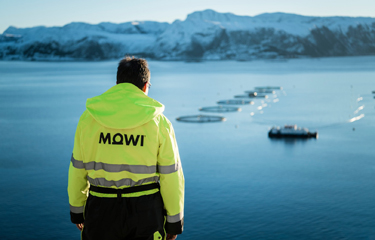The ongoing impacts of COVID-19 put significant downward pressure on Bergen, Norway-headquartered Mowi’s second-quarter results, lowering earnings and profits, as the company continues implementing long-term cost saving measures to counteract rising production costs.
Mowi posted lower operational earnings before interest and taxes (EBIT) of EUR 98.6 million (USD 116.4 million) for the second quarter of this year, representing less than half the record EUR 211.2 million (USD 249.4 million) achieved for the three-month period a year previously. The salmon farming group also saw prices for salmon decline across all markets during the quarter, resulting in reduced profits.
According to its latest results statement, Mowi’s operational revenues for the last quarter reached EUR 911 million (USD 1.1 billion), down from EUR 1 billion (USD 1.2 billion) in Q2 2019. In line with previous guidance, its total harvest volume for the three months was 104,303 metric tons (MT) gutted weight, up from 98,483 MT in Q2 2019, and 78,346 MT in Q2 2018.
However, its tonnage forecast for 2020 has been reduced by 8,000 MT to 442,000 MT due to biological issues in Scotland.
“Despite current market and logistical disruptions caused by COVID-19, Mowi’s operations have been running close to normal so far. We have implemented a wide range of protective measures to limit the spread of the virus in our operations,” Mowi CEO Ivan Vindheim said.
The company said Mowi Consumer Products benefitted from a shift in demand from foodservice to retail due to the global lockdown measures, and delivered all-time high sales volumes and results for a second quarter. The segment’s operational EBIT totaled EUR 23.3 million (USD 27.5 million), up from EUR 7.5 million (USD 8.9 million) in Q2 2019, while its revenues reached EUR 652.4 million (USD 770.3 million). The total volume sold was 56,749 MT.
“This is an impressive result under the prevailing circumstances and demonstrates yet again the importance of Mowi’s downstream strategy,” Vindheim said.
Despite introducing a cost-saving program in 2018 that has so far enabled the company to cut costs by EUR 118 million (USD 139.3 million), Mowi confirmed that it continues to experience cost pressure in its farming operations from more challenging biology, stricter regulations, and a general cost increase from input factors. This also impacts the rest of the value chain.
Because after feed, labor is Mowi’s largest cost, the board is to include a productivity program within the cost-saving program, targeting a 10 percent reduction in headcount by 2024.
“Addressing cost will continue to be of utmost importance in the future. This will be realized through automation, digitalization, improvement of production processes, and rightsizing of the organization. Mowi's strategy is still to grow the company and the aim is to continue to be a net job-creator,” Vindheim said.
Additionally, in light of the COVID-19 pandemic, the board will not distribute a quarterly dividend for the first and second quarters of this year.
With regard to its salmon farming operations, Mowi’s salmon of Norwegian origin achieved an operational EBIT-per-kilogram of EUR 1.06 (USD 1.25) in the last quarter, down from EUR 2.45 (USD 2.89) in Q2 2019. Mowi’s salmon of Scottish, Chilean, and Faroese origin also reported lower operational EBITs-per-kilogram of EUR 0.98 (USD 1.16), EUR 0.82 (USD 0.97), and EUR 1.89 (USD 2.23) respectively, with its Canadian salmon lost EUR 0.68 (USD 0.80) per kilogram. The company’s Irish salmon saw increased earnings, rising to EUR 3.83 (USD 4.52) per kilogram.
The Mowi Feed segment reported an operational EBIT of EUR 6.1 million (USD 7.2 million), up from EUR 3 million (USD 3.5 million) a year previously, with a seasonal high feed production of 144,501 MT, of which 109,747 MT was sold.
Mowi’s results statement also confirmed the global supply of salmon increased by 3.3 percent in the last quarter to 557,500 MT gutted weight, which was in line with expectations. In terms of contributions, Norway supplied 270,500 MT, a decrease of 2.5 percent; Scotland 41,000 MT, and increase of 0.7 percent; Chile 157,300 MT, an increase of 9.7 percent; and North America 37,800 MT an increase of 1.3 percent.
In market currencies, European prices decreased by 18 percent compared with the Q2 2019. In the United States, salmon prices decreased by 24 percent in Miami, 27 percent in Seattle, and 19 percent in Boston/New York.
Meanwhile, Mowi Scotland has confirmed that its salmon farm at Carradale North – consisting of 10 circular net pens containing 550,700 salmon of around 4.2 kilograms, shifted its position after becoming detached from its seabed anchors during Storm Ellen and strong tides in Kilbrannan Sound on 20 August 2020.
By 25 August, the farm was secured back in its correct location and all 10 pens had been either visually inspected for integrity and inventoried. Six of these pens were found to be structurally sound with fish in good condition. The remaining four pens were structurally compromised (two of which experienced torn netting), and the salmon contained within these have now either been harvested, removed as mortality, or escaped. Roughly 125,900 salmon were harvested, 30,616 were removed, and it’s estimated that 48,834 escaped.
The farm was installed five years ago, and the infrastructure was inspected three months ago.
Photo courtesy of Mowi







